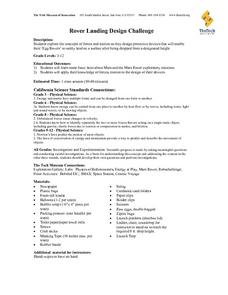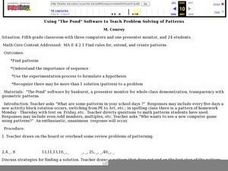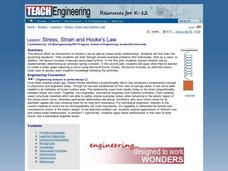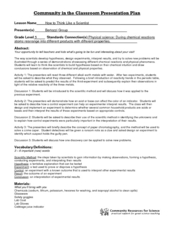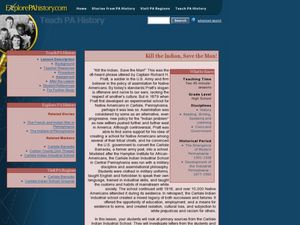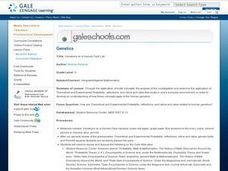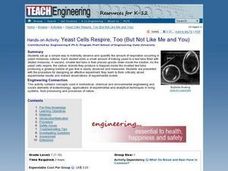Virginia Department of Education
Heat and Thermal Energy Transfer
How does radiation affect our daily lives? Answer that question and others with a lesson that discusses radiation and its use in thermal energy transfer through electromagnetic waves. Pupils investigate vaporization and...
Virginia Department of Education
Work and Power
Assist your class with correctly calculating the values for force, work, and power as they determine the amount various activities require. They gather data and participate in a group discussion to compare results upon conclusion of the...
Code.org
Text Compression
The second lesson in a unit of 15 introduces pupils to text compression. The class begins with discussing how they already use text compression when sending text messages. Pairs learn more about the subject as they work to compress a...
Massachusetts Department of Education
Similarity through Transformations
Create the ultimate miniature golf course. The 93-page model curriculum unit from the Massachusetts Department of Elementary and Secondary Education contains nine lessons on understanding similarity in terms of both Euclidean geometry...
Teach Engineering
Energy on a Roller Coaster
Roll with your class into the idea of conservation of energy. Pupils use a roller coaster track to collect data to reinforce the concept of conservation of energy and the influence of friction. Class members then create a graph from...
Teach Engineering
Force on a Current Carrying Wire
What do electrical currents have to do with an MRI? Using a simple wire setup and a magnet, class members explore forces used in an MRI by investigating the magnetic force acting on a wire carrying a current.
Teach Engineering
Measuring Surface Tension
How do you measure surface tension? The fifth installment of a nine-part series is an experiment where young scientists use tubes of different sizes to measure surface tension. They calculate the average and standard deviation of the...
Teach Engineering
Bubbles and Biosensors
Bubbles aren't just for children. In the third installment of a seven-part series, teenagers use bubble solution to create bubbles and observe patterns of refraction on the bubble surfaces. Application of this concept to thin films in...
National Institute of Open Schooling
Atomic Structure
Learners explain historical findings such as Rutherford and Bohr's contributions, explain wave particle duality, and formulate Heinsenberg's uncertainty principle. They also draw s, p, and d orbitals, explain more historical findings,...
Illustrative Mathematics
Complex number patterns
Start off with the definition of the imaginary number i, then have your class practice simplifying expressions involving powers of i and look for patterns. See how the cyclic nature of powers of i translate to sums of powers of i.
Curated OER
Disease and Epidemics
Explore how the study of diseases and epidemics can be comprehended from a mathematical perspective. Investigate finite geometric series, calculating threshold values, and statistical models of the spread of disease. How many makes it an...
Curated OER
Magic Sand-Hydrophopia and Molecules
Students study different kinds of sand, and practice their observational and writing skills.
Curated OER
Rover Landing Design Challenge
Young scholars examine the concepts of forces and motion. They work together to design protective devices for their egg rovers as they are dropped from a specific height. They record their observations and discuss.
Curated OER
Games for Probability: In-Class and Powerball Simulation
Your soon-to-be statisticians play a game to understand the difference between independent and dependent experiments and probability. They draw colored cubes from a bag and then, by either replacing the cube in the bag, or not, for each...
Curated OER
Measuring Temperature and the Production of CO2 in Yeast
Students use a model experiment to complete an experiment on yeast. In groups, they identify the independent and dependent variables and use the scientific method to complete the activity. They record their observations and discuss them...
Curated OER
Problem Solving of Patterns
Fifth graders use a software program to practice their problem solving skills. As a class, they identify patterns in their days at school and review problem solving patterns in math. They solve different problems and discover that the...
Curated OER
Are You Gellin
Young scholars conduct an investigation of differentiating between different types of DNA. This is done with a simulation activity of being a scientist in charge of selling different sets of DNA for research which requires different...
Curated OER
Stress, Strain and Hooke's Law
Students study Hooke's Law and stress-strain relationships. In this spring lesson students create a strain graph in Microsoft Excel.
Curated OER
How to Think Like a Scientist
Fifth graders study the scientific method and understand how to apply it. In this "thinking like a scientist" lesson plan students complete several activities.
Curated OER
Kill the Indian, Save the Man!
Students investigate primary sources from Carlisle Indian School including letters and photographs. In this investigative lesson students answer questions about their research.
Curated OER
Probability and Expected Value
Students collect data and analyze it. In this statistics lesson, students make predictions using different outcomes of trials.
Curated OER
Variations on a Human Face Lab
Ninth graders gain an application level understanding of probability, symmetry, and ratios and rates that exists in one's everyday environment relative to human genetics.
Curated OER
TE Activity: Yeast Cells Respire, Too (But Not Like Me and You)
Student observe and quantify the respiration that occurs in yeast-molasses cultures. They complete an effective experiment in order to examine how to think critically about the results.
Curated OER
Identifying Variables
In this variables worksheet, students are given seven experiments that they read and identify the independent variable, dependent variable, control group and standardizing variable.














